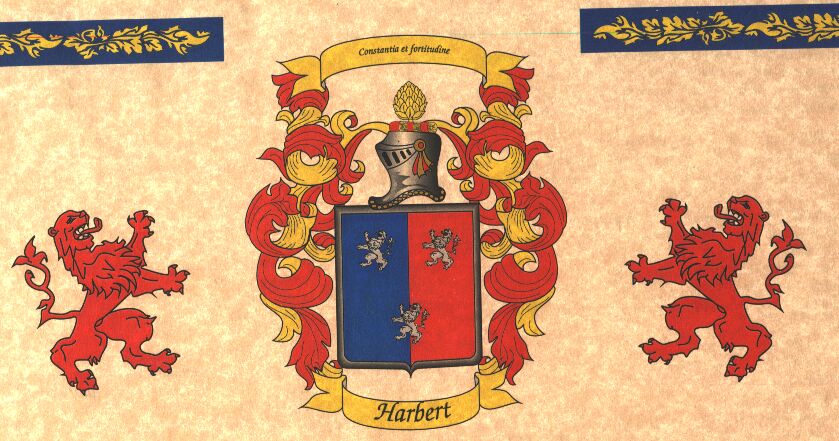The Ancient History of the Distinguished Surname Harbert

The Ancient History of the Distinguished Surname
Harbert
The ancient chronicles of England reveal the early records of
the name Harbert as a Norman surname which ranks as one of the
oldest. The history of the name is closely interwoven within
the majestic tapestry as an intrinsic part of the history of
Britain.
In-depth research by skilled analysts into ancient manuscripts
such als the Domesday Book (compiles in 1086 by William the
Conqueror), the Ragman Rolls, the Wace poem, the Honour Roll of
the Battel Abbey, The Curia Regis, Pipe Rolls, the Falaise Roll,
tax records, baptismales, family genealogies, local parish and
church records, shows the first record of the name Harbert was
found in Suffolk where they were seated from very early times and
were granted lands by Duke William of Normandy, their liege Lord,
for their distinguished assistance at the Battle of Hastings in
1066 A.D.
Many alternate spellings were found in the archives researched,
typically linked to a common root, usually one of the Norman
nobles at the Battle of Hastings. Although your Name, Harbert,
appeared in many references, from time to time the surname included
Herbert, Herbit, Herbutt, and these changes in spelling frequently
occurred, even between father and son. Scribes recorded and spelled
the name as it sounded. Typically a person would be born with
one spelling, married with another, and buried with a headstone
which showed another. All three spellings related to the same
person. Sometimes preferences for different spelling variations
either resulted from a branch preference, religious affiliation,
or someti mes nationalistic statements.
The family name Harbert is believed to be descended originally
from the Norman race, frequently but mistakenly assumed to be of
French origin. They were more accurately of Vikin origin. The
Vikings landed in the Orkneys and Northern Scotland about the
year 870 A.D., under their King, Stirgud the Stout. Thorfinn
Rollo, his descendant landed in northern France about the year
910 A.D. The French King, Charles the Simple, after Rollo laid
siege to Paris, finally conceded defeat and granted northern
France to Rollo. Rollo became the first Duke of Normandy, the
territory of the north men. Rollo married Charles' daughter and
became a convert to Christianity. Duke William who invaded and
defeated England in 1066, was descended from the first Duke Rollo
of Normandy.
Duke William took a census of most of England in 1086, and
recorded it in the Domesday Book. A family name capable of being
traced back to this manuscript, or to Hastings, was a signal
honour for most families during the middle ages, and even to this
day.
The surname Harbert emerged as a notable family name in the
county of Suffolk where they were recorded as a family of great
antiquity seated with manor and estates in that shire. They are
said to be descended from Herbert, Count of Bermandois, who
accompanied William the Conqueror into England, and was
Chamberlain to his son King William Rufus. They were granted
lands in Suffolk which were extended into Dorset by the year 1206
and Norfolk in 1230. They moved into South Wales by the mid 15th
century. Baron Herbert was created Earl of Pembroke and his
brother Sir Richard Herbert held the Welsh castle of Raglan in
Monmouthshire. Sir Henry Herbert later succeeded to Raglan
Castle. Prominent amongst the family at this time was Sir Richard
Herbert.
The surname Harbert contributed much to local politics and in the
affairs of England or Scotland. During the 11th and 12th
centuries many of these Norman families moved north to Scotland.
Later, in the 16th, 17th and 18th centuries England was ravaged
by religious and political conflict. The Monarchy, the Church and
Parliament fought for supremacy. Religious elements vied for
control, the State Church, the Roman Church and the Reform
Church. All, in their time, made demands on rich and poor alike.
They broke the spirit of men and many turned from religion, or
alternatively, renewed their faith, pursuing with vigour and
ferocity, the letter of the ecclesiastical law. Many families
were freely ``encouraged'' to migrate to Ireland, or to the
``colonies''. Nonbelievers or dissidents were banished, sometimes
even hanged.
The settlers in Ireland became known as the ``Adventurers for
land in Ireland''. They undertook to keep the Protestant faith.
In Ireland they settled in the 14th century in counties Kerry and
Cork.
The democratic attitudes of the New World spread like wildfire.
Many migrated aboard the fleet of sailing ships known as the
''White Sails''. The stormy Atlantic, small pox, dysentery,
cholera and typhoid took its toll on the settlers and many of
these tiny, overcrowded ships arrived with only 60 or 70 % of
their passenger list. The migration or banishment to the New
World continued, some voluntarily from Ireland, but mostly
directly from England or Scotland, their home territories. Some
clans and families even moved to the European continent.
In North America, migrants which could be considered a kinsman
of the family name Harbert, or variable spellings of that same
family name included Elizabeth Herbert settled in the Barbados
in 1671; John Herbert settled in Salem Mass. in 1630; Thomas
Herbert settled in Virginia in 1651; William Herbert and his
wife Elizabeth settled in the Barbados in 1679; Charles, Edward,
George, John, Joseph, Michael, Patrick, and William Herbert settled
in Philadelphia between 1840 and 1860. From the port of arrival
many settlers joined the wagon trains westward. During the American
War of Independence some declared their loyality to the Crown
and moved northward into Canada and became known as the United
Empire Loyalists.
There were many notables of this name Harbert, John Herbert Australian
Politician; Hugh Herbert, Actor; Earl of Carnarvon, Pembroke,
and Powys; Baron Hemingford; General Sir Otway Herbert; Roscoe
Herbert, Principal.
Research has determined the above Coat of Arms to be the most
ancient recorded for the family surname Harbert.




